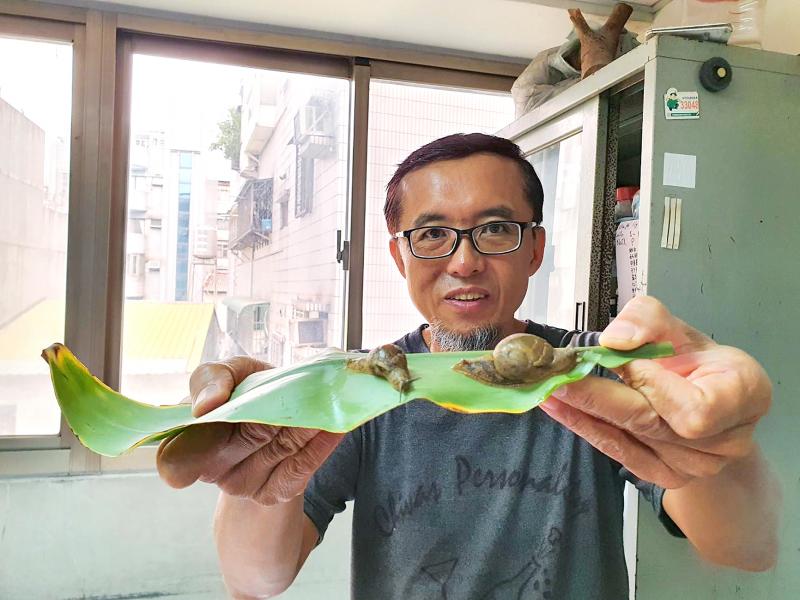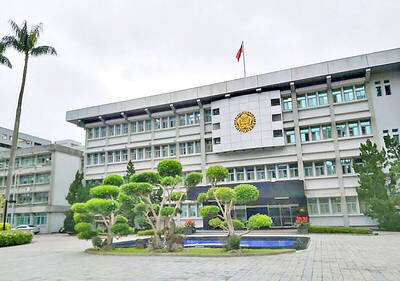An environmental educator and researcher on Monday said that he believes he found a species of invasive semi-slug that was thought to have disappeared from Taiwan, potentially posing a threat to certain crops.
Watson Crick’s Scientific Lab founder Hua Shun-fa (華順發) and a group of elementary and middle-school students earlier this month found four of the semi-slugs while conducting a research lesson on Taoyuan’s Hutoushan (虎頭山), he said.
He sent a specimen to the Taiwan Endemic Species Research Institute in Nantou County’s Jiji Township (集集) for DNA testing to confirm whether it was Parmarion martensi, a type of semi-slug that is particularly harmful to papaya, wasabi and other crops.

Photo: Wei Chin-yun, Taipei Times
Upon preliminary inspection, institute specialist Tsai Chi-li (蔡奇立) said that they believe it is an invasive species of Macrochlamys land snail, but as the creature’s shell was crushed during transport, they could not remove any samples and needed to wait to conduct tests.
There are more than 300 species of snail in Taiwan, 70 percent of which are endemic, Tsai said, adding that most live in mountainous areas and are seldom seen by people.
Most invasive snails are brought by flora imported for gardening, but are usually stymied by the required pesticide treatment for imported plants, he said.
The Taoyuan Department of Agriculture said that it had not heard of any P martensi sightings before now.
Regardless, papaya is not one of the city’s main agricultural products and wasabi is no longer cultivated there, it said, adding that it would nevertheless continue to monitor the situation and gather a team of experts to respond if necessary.
Most people are aware that creatures with shells are called snails and those without are slugs, but semi-slugs are evolutionarily in between, with shells that have nearly disappeared, but are not quite vestigial, Hua said.
In Taiwan, they fall under the snail category, but in China, people call them slugs, he added.
The shell of a P martensi is translucent and yellowish in color, measuring about 1.5cm long and 1cm wide, while its body is about 4cm long and ranges from dark gray to dark brown, with a small protrusion on its tail, Hua said.
Similar to spiders and certain types of larvae, it excretes a mucus from its tail that sticks to itself so that it can safely drop from high distances, allowing it to cover more ground, he said.
Insecticides, coffee grounds, tea tree oil and neem oil are not very effective against the semi-slugs, but distilled camellia oil seems promising, Hua added.
The creature was discovered in Cambodia in 1893, and was later brought to China, Japan, the Philippines and Hawaii, he said.
If confirmed, it would be the first sighting of the creature in Taoyuan.
Hua said that the semi-slug is a good host for the rat lungworm, or Angiostrongylus cantonensis, which can cause eosinophilic meningitis in humans.
In 1985, members of the Kimlan Foods Co family contracted the parasite after eating raw giant African snails, killing four and leaving another bedridden, Hua said, adding that only the third son, who was abroad at the time, survived to take over the business.

The German city of Hamburg on Oct. 14 named a bridge “Kaohsiung-Brucke” after the Taiwanese city of Kaohsiung. The footbridge, formerly known as F566, is to the east of the Speicherstadt, the world’s largest warehouse district, and connects the Dar-es-Salaam-Platz to the Brooktorpromenade near the Port of Hamburg on the Elbe River. Timo Fischer, a Free Democratic Party member of the Hamburg-Mitte District Assembly, in May last year proposed the name change with support from members of the Social Democratic Party and the Christian Democratic Union. Kaohsiung and Hamburg in 1999 inked a sister city agreement, but despite more than a quarter-century of

The Ministry of Foreign Affairs (MOFA) yesterday expressed “grave concerns” after Singaporean Prime Minister Lawrence Wong (黃循財) reiterated the city-state’s opposition to “Taiwanese independence” during a meeting with Chinese Premier Li Qiang (李強). In Singapore on Saturday, Wong and Li discussed cross-strait developments, the Singaporean Ministry of Foreign Affairs said in a statement. “Prime Minister Wong reiterated that Singapore has a clear and consistent ‘one China’ policy and is opposed to Taiwan independence,” it said. MOFA responded that it is an objective fact and a common understanding shared by many that the Republic of China (ROC) is an independent, sovereign nation, with world-leading

The Ministry of Justice Investigation Bureau (MJIB) has been investigating nine shell companies working with Prince Holding Group, and the Taipei District Prosecutors’ Office is seeking further prosecution of alleged criminals, a source said yesterday. The nine companies and three Taiwanese nationals were named by the US Department of the Treasury’s Office of Foreign Assets Control (OFAC) on Oct. 14 as Specially Designated Nationals as a result of a US federal court indictment. Prince Holding founder Chen Zhi (陳志) has been charged with fraud, conspiracy, money laundering and overseeing Prince Holding’s suspected forced-labor camps in Cambodia, the indictment says. Intelligence shared between Taiwan,

COOLING OFF: Temperatures are expected to fall to lows of about 20°C on Sunday and possibly 18°C to 19°C next week, following a wave of northeasterly winds on Friday The Central Weather Administration (CWA) on Sunday forecast more rain and cooler temperatures for northern Taiwan this week, with the mercury dropping to lows of 18°C, as another wave of northeasterly winds sweeps across the country. The current northeasterly winds would continue to affect Taiwan through today, with precipitation peaking today, bringing increased rainfall to windward areas, CWA forecaster Liu Pei-teng (劉沛滕) said. The weather system would weaken slightly tomorrow before another, stronger wave arrives on Friday, lasting into next week, Liu said. From yesterday to today, northern Taiwan can expect cool, wet weather, with lows of 22°C to 23°C in most areas,